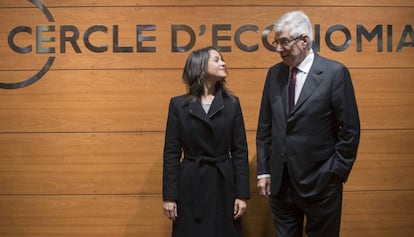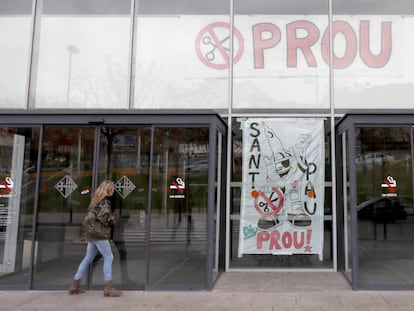Business creation drops 14.3% in Catalonia as independence push bites
Corporate leaders seeking economic stability eye Constitutionalist parties in run-up to regional election

Catalonia has paid an economic price for the flurry of political activity by the pro-independence movement in October.
After a frantic month bookended by an illegal independence referendum on October 1 and a unilateral declaration of independence in the regional parliament on October 27, business creation had dropped 14.3% year on year to 1,224 new firms, according to the latest figures from Spain’s National Statistics Institute, the INE.
Sacked Catalan premier Carles Puigdemont has criticized large firms and sided with small and medium-sized enterprises
Spain as a whole chalked up a 1.5% year-on-year uptick in new businesses, with the total number of new firms hitting 7,236.
The 1,224 new businesses in Catalonia is the worst October figure for the region since 2011 – during the height of Spain’s crippling economic crisis. It is also the second-worst figure for this year to date for the region after September, and the third worst year-on year result in Spain behind Extremadura and Galicia, which saw falls of 27.5% and 15.65% respectively.
At the other end of the scale, the number of new businesses in La Rioja was up 21.42% on October 2016, while that figure was 20.93% higher for Aragon.
“October was a very bad month for Catalonia, there was an enormous amount of mistrust, which was reflected in numerous indicators,” said Spanish Economy Minister Luis de Guindos on Tuesday, speaking about a month in which over 1,000 businesses – including the banking giants Sabadell and La Caixa – moved their legal headquarters out of the region over fears about independence.
Asked about the effects of Madrid’s application of emergency powers in Catalonia using Article 155 of the Spanish Constitution – a move which involved sacking the regional government and calling a snap regional election on December 21 – the minister said “a normalization of the Catalan economy” was apparent. He added that the “madness” of the independence movement would disappear from the Catalan scene after the upcoming vote. Guindos also said Catalonia would return to 3% growth.
Business leaders
Meanwhile, far from attempting to woo back the large firms that have left Catalonia in recent months, ousted Catalan premier Carles Puigdemont has turned his attention to small and medium-sized enterprises.
Speaking via a video link from Belgium during a meeting in Barcelona on Friday, Puigdemont described the decision by around 3,000 businesses to move their headquarters out of Catalonia as “economic warfare” by Madrid. He also took aim at Spain’s blue-chip Ibex 35 stock market index, which until October included seven Catalan firms but now only has one: the pharmaceutical and chemical company Grifols.
The 1,224 new businesses in Catalonia is the worst October figure for the region since 2011
“Our small and medium-sized enterprises are those that don’t change their headquarters, those that have to make a living without the influence of a corporate box at the [exclusive Real Madrid stadium] Bernabéu or on the Ibex 35,” the sacked premier said, ignoring the fact that hundreds of smaller firms have also left the region.
This attitude represents a far cry from the times of the Democratic Convergence of Catalonia (CDC) party, the forerunner of Puigdemont’s Catalan European Democratic Party (PDeCAT). The CDC had close links with the Catalan business community. The arrival in power of “business-friendly” former CDC president Artur Mas in 2011 was greeted enthusiastically by the corporate world, as were his government’s austerity and privatization policies.
But several years on, regional business leaders keen for “economic stability” and concerned about a possible return to hard-line independence tactics by pro-secession parties are backing the so-called Constitutionalist – or anti-independence – parties ahead of the December 21 regional elections.
On Tuesday, Carlos Cuatrecasas, the president of the of the Economy Circle – the most influential business lobby in Catalonia – described Inés Arrimadas, the leader of the reform-minded Ciudadanos party in the region, as a “magnificent candidate.”

During her appearance at the Economy Circle, Arrimadas promised a reduction in the tax burden for businesses, but also emphasized her concern over “social division” resulting from the independence push in Catalonia.
Ciudadanos is riding high in the polls in the run-up to December 21, with an EL PAÍS analysis of dozens of voter intention surveys suggesting the party will run a close second behind the pro-independence Republican Left of Catalonia (ERC).
English version by George Mills.









































